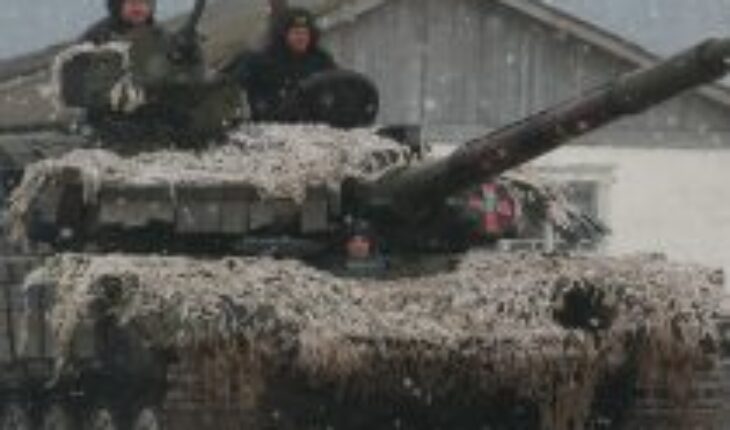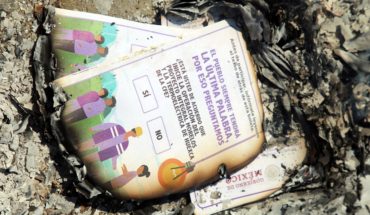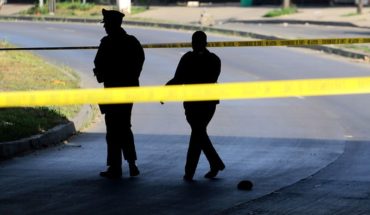President Volodymyr Zelenskiy called on Ukrainians to wave the country’s flags on buildings and sing the national anthem in unison on Feb. 16, a date that some Western media have cited as a possible start to a Russian invasion.
Ukrainian officials stressed that Zelenskiy was not predicting an attack on that date, but responding with skepticism to foreign media reports. Several Western media organizations have cited U.S. and other officials citing the date when Russian forces would be ready for an attack.
“We are told that February 16 will be the day of the attack. We will turn it into a day of unity,” Zelenskiy said in a video aimed at the nation. “They are trying to scare us by once again naming a date for the start of military action.”
“On that day, we will hang our national flags, use yellow and blue banners and show the whole world our unity,” he added.
Zelenskiy has long maintained that while he believes Russia is threatening his country, Ukraine’s Western allies have exaggerated the likelihood of an imminent attack, in response to Moscow’s efforts to intimidate Ukraine and sow panic.
Mykhailo Podolyak, an adviser to Zelenskiy’s chief of staff, told Reuters the president was responding in part “with irony” to news reports about the possible date of the invasion.
“It is quite understandable why Ukrainians today are skeptical about several ‘specific dates’ of the so-called ‘start of the invasion’ announced in the media,” he said. “When the ‘beginning of the invasion’ becomes a kind of continuous tour date, such media announcements can only be taken with irony.”
Zelenskiy’s office released the text of a decree calling for all Ukrainian towns and cities to fly the country’s flags on Wednesday and for the entire nation to sing the national anthem at 10 a.m. local time. He also called for an increase in the salaries of soldiers and border guards.
U.S. officials said they did not predict an attack ordered by Russian President Vladimir Putin on a specific day, but repeated warnings that it could happen at any time.
“I won’t go into a specific date, I don’t think it’s smart. I would just tell them that it’s very possible that he could move with little or no warning,” Pentagon spokesman John Kirby told reporters. Previously, the official had claimed that Moscow continued to increase its military capabilities on the Ukrainian border.
Secretary of State Antony Blinken claimed that Washington, which has already sent home most of its diplomats, was moving its remaining diplomatic mission in Ukraine from Kiev to the western city of Lviv, much farther from the Russian border. He cited a “dramatic acceleration in the build-up of Russian forces.”
CONTINUE WITH DIPLOMACY
Russia has more than 100,000 troops concentrated near the border with Ukraine. He denies Western accusations that he is planning an invasion, but says he could take unspecified “military-technical” actions unless a number of demands are met, including preventing Kiev from joining the NATO alliance.
Moscow suggested on Monday that it was ready to continue talking to the West to try to calm the security crisis.
In a televised exchange, President Vladimir Putin was shown asking his foreign minister, Sergei Lavrov, if there was a possibility of reaching an agreement to address Russia’s security concerns, or if the country was heading for tortuous negotiations.
Lavrov replied: “We have already warned more than once that we will not allow endless negotiations on issues that demand a solution today.” But he added: “It seems to me that our possibilities are far from exhausted … At this time, I would suggest continuing and increasing them.”
Western countries have already promised sanctions on an unprecedented scale if Russia invades. The G7 warned of “economic and financial sanctions that will have massive and immediate consequences on the Russian economy.”
U.N. Secretary-General Antonio Guterres spoke separately monday with the foreign ministers of Russia and Ukraine, and continues to believe “from his own analysis and his own hope” that there will be no conflict, a U.N. spokesman said.
Moscow claims that Ukraine’s claim to join the Western military alliance poses a threat. Although NATO has no immediate plans to admit Kiev, Western countries say they cannot negotiate on a sovereign country’s right to form alliances.
Ukrainian President Declares February 16 as “Unity Day,” Cited as Possible Russian Invasion Date
February 15, 2022 |





